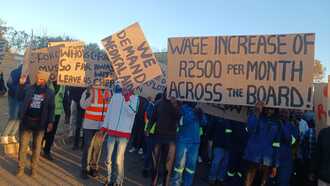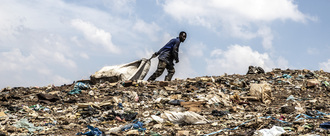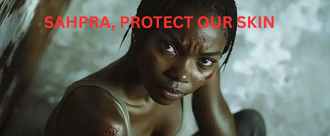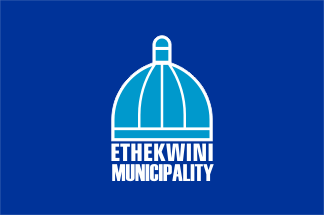- Featured
- Clean air
- Climate justice
- Consumer Rights
- Corporate Accountability
- Data access
- Early Childhood Development
- Economic fairness
- Education
- Electoral fairness
- Environmental justice
- Food justice
- Gender based violence
- Grants/social assistance
- Health
- Housing and infrastructure
- Industry interference
- Land Justice
- LGBTQIA+ rights
- Media/ information access
- Public transport
- Racism
- Reparations
- Safety
- Sanitation
- Service Delivery
- Sexual and Reproductive Rights
- Social justice
- Unemployment
- Womxn's rights/ gender equality
- Workers' rights
- More
-
Make the striking workers at pallet making giant, Chep South Africa, permanent now!Please join the campaign to support the strike at Chep South Africa. You can attend the strike - please contact 082 812 1934 for details of daily pickets - or contribute to the workers' strike fund here: Chep Workers Solidarity Fund Standard Bank Account number 10258528166167 of 200 SignaturesCreated by Casual Workers' Advice Office media hub
-
Ban gambling adverts + sponsorships now!People in South Africa now spend more on gambling than they do on any other recreational activities [6]. Many people gamble because their salaries are not enough [7]. It is concerning that such a high percentage of people are into gambling. This is an urgent matter, and the government must start moving quickly to curb this crisis. Gambling companies have invaded our communities; they sponsor community runs, do charity work, aggressively put their logos in schools, and indirectly advertise to children [8]. The current National Gambling Act states that gambling companies are not allowed to place advertisements in media directed to children [9]. Yet, gambling companies are buying kids' soccer uniforms with their logos, turning our children into walking billboards. The more visible the thing, the more attention it attracts, and this is why we find ourselves in this situation as a nation. These companies should stop involving themselves in our cultural, educational, and sporting events. Their sponsorship is an advertisement disguised as social development. They are attempting to create good product imagery and consequently rope people into gambling. We have to remember that the charity work and sponsorships that gambling companies do in our communities are funded by extracting money from the very same communities. In the end, gambling companies are the real winners. Gambling, like smoking, harms our society. South Africa needs to ban gambling ads and sponsorships, just like we did with tobacco. While sports, arts and culture events often need sponsors, there are plenty of sponsors out there, and evidence suggests banning sponsorship does not harm sport [10]. Cricket in South Africa was heavily sponsored by the tobacco industry in the past, but they voluntarily ended the sponsorship out of principle. Protecting our communities from harm should always be the priority. If we want to reduce gambling, it makes sense to start by reducing the temptation to gamble [11]. South Africa also needs to join the global call to restrict gambling advertisements. Countries like Kenya have started implementing tighter gambling regulations to protect their young people from gambling addiction [12]. We need to come together to combat this gambling crisis we find ourselves in. We are already facing so many issues as a nation, and we cannot afford to add another one. We call for the government to ban gambling advertisements and stop the infiltration of betting sponsorships into our Sports, Arts and Culture, as well as our education. References 1. Every single billboard on R21 to OR Tambo Airport is illegal, says Sanral, Anna Cox for Daily Maverick, 21 July 2025. 2. Gayton McKenzie slammed for ‘promoting’ gambling in vulnerable communities, Zama Nteyi for Sunday World, 16 July 2025. 3. Are gambling advertisements putting minors at risk? Mayibongwe Maqhina for IOL, 09 May 2025. 4. Online gambling and betting advertising is non-compliant with Gambling Act — minister, Ina Opperman for The Citizen, 09 May 2025. 5. Govt to appoint gambling council as it looks to crack down on ‘noncompliant’ ads, Na'ilah Ebrahim for News24, 08 May 2025. 6. Appetite for gambling and betting grows https://www.statssa.gov.za/?p=18746, Statistics South Africa, 05 September 2025. 7. Betting on desperation: How the poor are fueling SA’s gambling boom, Jeremy Maggs for MoneyWeb, 11 June 2025. 8. Hollywood Bets sponsors soccer kids, David Pienaar for the Alberton Record, 01 May 2017. 9. National Gambling Act 7 of 2004 https://www.gov.za/sites/default/files/gcis_document/201409/26994.pdf. 10. Tobacco free sports. play it clean, World Health Organisation, 2002. 11. Gambling by World Health Organisation, 2 December 2024 https://www.who.int/news-room/fact-sheets/detail/gambling. 12. Kenyan MPs Push for Tougher Gambling Regulations in the New Gambling Control Bill, Vanja Mitic for World Casino News, 31 July 2025.590 of 600 SignaturesCreated by amandla mobi member

-
Keep the landfills open to protect our city and the environmentAccording to Pikitup, by this time next year, all four of its functioning landfills will be closed. Its solution? Pay R68 million in the 2025/25 year alone, to send the city’s waste to private landfills and enter public-private partnerships to build an incinerator and a mega landfill. This will put thousands of landfill reclaimers out of work, cause significant environmental harm, and leave the city drowning in its own waste. As residents, we say no to opting for environmental and social injustice. Pikitup and the City of Johannesburg created this crisis. The 2011 City of Johannesburg Integrated Waste Management Plan noted the looming closure of the city’s landfills and highlighted the urgent need for projects to increase the capacity of existing landfills, implement separation at source to divert recyclables from landfills, and build new landfills. Instead, it delayed projects to increase capacity at the landfills, took no action to build its own new landfills, and continues to pursue ineffective and expensive separation at source by cooperatives and private companies. No one wants a mega landfill beside their home. If Pikitup does find a place for a mega landfill, it will be far from where people live, increasing diesel costs and causing great environmental harm. The reclaimers who have worked so hard for many years to keep our landfills open cannot just be thrown away like trash. Their organisation, ARO, has implemented highly effective, environmentally sustainable separation at source projects that do not require reclaimers to form cooperatives. A recent ARO reclaimer led 18-month programme, ending June 2025, indicates that 945 reclaimers in Johannesburg collected 46 000 tonnes of recyclables that have been successfully diverted from landfills. ARO has solutions to avoid the double social and environmental crisis that will result from Pikitup and the City’s plans. As such ARO demands Pikitup and the City if Johannesburg to: - Have a participatory policy process including ARO, residents, and environmental experts to develop other sustainable solutions to avoid privatisation of landfills; - Urgently implement projects to move the drainage pond at Marie Louise landfill and purchase adjacent land to extend its lifespan; - Implement similar projects at all other landfills; - Negotiate social plans for landfill reclaimers so that they can continue to salvage and sell residents’ recyclables through reclaimer-run separation at source programmes; - Implement reclaimer-led separation at source across the city to reduce the need for new landfills; and - Sign the formal partnership agreement with ARO that has been languishing at Pikitup Head Office for years.319 of 400 SignaturesCreated by Eli Kodisang
-
Tell The Minister to Ensure Access to Mathematics for Children in Low-Income CommunitiesBlack people are hit hardest by unemployment. Besides being the subject upon which logical thinking, problem-solving are built, mathematics opens the door to careers in science, technology, and engineering(5). This means that if Sisonke wants to be a doctor, an accountant or engineer, she needs to study mathematics in high school. If she does not, then that dream cannot be a reality. Also, a qualification in STEM is highly beneficial to people facing high unemployment levels as one's chances of getting a job are high given the demand for people in those fields. Additionally, medical doctor, accountant and engineering jobs pay higher salaries which enable people from low-income communities to pull themselves out of poverty. Children in low-income communities are being excluded from future economic growth. Public schools are divided into quintiles 1 to 5. This is based on the socioeconomic status of the communities they are situated in. Quintiles 1, 2 and 3 schools are schools that do not pay fees, making them the schools that serve children from low-income households. “Data shows that poorer learners are significantly less likely to be able to access options at many universities as they are not enrolled for Mathematics.”(3). And that is the department’s fault. How can the department say that its policy is that there must be at least 35 learners for a subject to be taught yet there is a school that has 161 learners in matric and all of them are doing maths literacy (6)? The department is not only going against its own policy but it is setting up children for difficulty in finding work in the future. “Schooling outcomes will likely benefit children at richer-paying schools, with learners from these schools better positioned to access opportunities associated with STEM post-school education and subsequently employment opportunities.”(3). Above all that, the drop in the number of pupils studying mathematics also leads to a shortage of skills in the fields of Science, Technology, Economics and Mathematics (STEM). A shortage of skills means as a country we cannot come with new and better solutions to our challenges, compete with the rest of the world and create economic opportunities. This leaves our country underdeveloped and its people remain in poverty. When the department denies children from low income communities access to mathematics, it is continuing the legacy of apartheid that denied black people entry to these careers. It is deepening inequality. And it is subjecting generations and generations of black children from low-income households to a never ending cycle of poverty. Let us call on the minister of education to grant children from low income communities access to mathematics. If enough of us can sign this petition, we can ensure that the minister moves to ensure that the thousands of children in rural areas and townships are able to study mathematics. References 1. https://www.gov.za/news/speeches/minister-siviwe-gwarube-basic-education-dept-budget-vote-202526-ncop-07-jul-2025 2. https://stemlab.co.za/the-critical-need-for-stem-education-in-south-africa/ 3. https://www.gcro.ac.za/outputs/map-of-the-month/detail/grade-10-enrolments-by-type-of-mathematics-in-the-gauteng-province/ 4. https://pmg.org.za/committee-meeting/40662/ 5. https://www.tandfonline.com/doi/full/10.1080/20421338.2024.2417779#d1e165 6. https://www.youtube.com/watch?v=cv7e-gDgPBQ128 of 200 SignaturesCreated by Asanda Bikitsha
-
From Queues to Access: End the Backlog of Unregistered Children and Fix Home Affairs Now!The backlog and system failures at DHA do more than delay documents; they have real consequences for children and families. Some of the most affected are children with one parent born in South Africa and another from a neighbouring country such as Lesotho or Botswana. These children are often trapped in a legal limbo, as DHA may require DNA testing before registration, with costs ranging from R750 at public laboratories to between R1,400 and R 2,800 at private accredited facilities [5][6][7]. A mother from Lesotho shared her experience of trying to register her seven-year-old son, who has a South African father: “I have spent months trying to get my son’s birth certificate. DHA says we need DNA tests, which I can’t afford. He missed school last term, and I feel powerless.” This story highlights the human cost of systemic failures, leaving children invisible and deepening inequality. It is a story experienced by many South Africans: whether in rural or urban areas, families are often forced to navigate complex bureaucracy, sometimes facing discrimination or delays simply because of where their children were born. These barriers violate children’s constitutional rights to access government services and information [7]. We call on Minister Dr. Leon Schreiber to act now by : • Implementing a public-facing tracking system for birth registration applications, allowing caregivers to monitor the status of pending applications in real time, including updates via online platforms, SMS, or USSD for those without internet access. • Providing dedicated support for digitally excluded caregivers, through local clinics, libraries, community centres, and DHA help desks, where staff can assist families in completing registrations and accessing government services without needing online access. Every day without action is another day a child remains invisible. As Home Affairs prepares to roll out AI-powered self-service kiosks, we must ensure these efforts prioritise children and communities who have waited the longest. Sign this petition to demand immediate action from Minister Schreiber. Together we can end the backlog, fix Home Affairs’ broken systems, and ensure every child is recognised and able to claim their rights!! Home Affairs must deliver reliable services for all! References 1. Conviction. (2025). Locked out of childhood: Home Affairs birth registration backlog. https://www.conviction.co.za/locked-out-of-childhood-home-affairs-birth-registration-backlog/#google_vignette 2. News24. (2023) Key internet penetration goal almost met in SA, 2022 Census reveals. News24, 13 October. Available at: https://www.news24.com/news24/tech-and-trends/news/key-internet-penetration-goal-almost-met-in-sa-2022-census-reveals-20231013 3. GroundUp. (2025, June 17). Home Affairs has left a quarter of a million people waiting years for birth certificates.https://www.groundup.org.za/article/home-affairs-has-left-a-quarter-of-a-million-people-waiting-years-for-birth-certificates/ 4. OpenSignal. (2023). Rural-urban digital divide in South Africa. https://www.opensignal.com/2023/12/13/rural-urban-digital-divide-still-poses-a-challenge-in-south-africa 5. AFP. (2022). Fact-check: DNA testing costs for child registration in South Africa. 6. GENEdiagnostics. (2024). Legal DNA testing services. 7. Legal Resources Centre. (2025, June 18). Court challenge over delays in child birth registration.https://lrc.org.za/court-challenge-over-massive-delays-in-child-birth-registration/23 of 100 SignaturesCreated by Orthalia Kunene
-
Urgent Request for Road Safety Measures on Boiketlong/Houtkop RoadBoiketlong Road has become a death trap for children and pedestrians. The recent tragedy, where young learners lost their lives while crossing the road after getting off a school bus, has left families broken and the entire community in mourning. Every day, hundreds of children and residents are forced to cross this unsafe road without speed control measures, pedestrian crossings, or warning signs for drivers. Without urgent intervention, more lives will be lost. This is not just a road issue — it’s a matter of child safety, community wellbeing, and social justice. No parent should live in fear each time their child walks to or from school. By installing speed humps, pedestrian facilities, and proper signage, the government can save lives, prevent further heartbreak, and uphold the right of children to a safe environment.85 of 100 SignaturesCreated by Nolwazi Shongwe

-
Give Us A List Of Skin Products That Are IllegalAccording to BBC, South Africa became the first country to ban the sale of skin lightening creams that have hydroquinone, that was in 1990[1]. Because we are the first country to ban creams with hydroquinone we should be leading the fight against harmful skin products, but that is not the case because many black women are still suffering the consequences of using harmful skin products, especially illegal skin lightening products. SAHPRA has a list of their responsibilities on their website[4], one of those resposibilities is ensuring that unregistered health products are removed from the public but, how can the public know when a product is illegal if SAHPRA doesn't list them on their website? According to SAHPRA’s section 21, certain unregistered products are allowed to be sold, how can we tell whether an unregistered product is authorised to be sold or not? SAHPRA has a list of registered health products on their website, it should be easy for them to have a list of products we should be wary of. Such transparency will allow people to make informed choices, it will help prevent the sale of dangerous skin products and also protect people’s health. The Guardian reported that skin lightening products are linked to cancer in black women, melanin found in black people protects the skin against sun damage and when they use illegal skin products they remove the protection they had against sun damage[2]. Despite regulations in place, Daily Maverick shared that South Africa's market of illegal skin lightening products is growing and the products are not only sold by informal vendors in shops but also online, quoting platforms like eBay, Takealot, Facebook and many more[3]. SAHPRA has the power to let people know what skin products are illegal, but they are choosing to turn a blind eye and instead, they tell us to report illegal health products. How can we report illegal products when we can’t even identify them? this negligence is putting more and more people’s health at risk because not everyone can identify illegal health products, a lot of these products are sold online, SAHPRA must evolve, catch up and utilise the internet to name and shame these products by publicising a list, inspect, raise awareness and share information. Let's come together by signing this petition, tagging South African Health Products Regulated Authority(SAHPRA) on all their social media platforms and also visiting their website and tell them that we want a list of illegal skin products, we see their incompetence, we don’t like it and we won’t tolerate it anymore. [1] How South Africa banned skin lightening creams, BBC, July 3 2020 BBC Audio | Witness History | How South Africa banned skin-lightening creams [2] Colonial ideas of beauty: how skin lightening products are linked to cancer in black African women, 30 July 2025, Kat Lay. https://www.theguardian.com/world/2025/jul/30/colonial-beauty-skin-lightening-products-linked-cancer-black-african-women [3] Skin lightening whitewash: Global and domestic bans of cosmetics containing Mercury prove to be skin deep, Tony Carnie for Daily Maverick, 15 February 2022. https://www.dailymaverick.co.za/article/2022-02-15-skin-lightening-whitewash-global-and-domestic-bans-of-cosmetics-containing-mercury-prove-to-be-skin-deep/ [4] SAHPRA’s Regulatory Compliance, Unit Responsibilities List. https://www.sahpra.org.za/inspectorate-pharma-licencing-and-regulatory-compliance/67 of 100 SignaturesCreated by Rina Lekoloane
-
Africa Day Now! Make 25 May a National Public HolidayAfrica Day is not just a date in the calendar; it is the heartbeat of our liberation story. On the 25th of May 1963, African leaders came together to declare that the future of the continent could no longer be dictated by foreign powers, but by Africans themselves. This unity gave birth to the Organisation of African Unity, the predecessor of today’s African Union. Without this collective effort, many nations, including our own, might still be under the chains of colonial rule. Recognising Africa Day as a national holiday honours that history, but also reminds us of the power of unity in the present. In South Africa, our freedom was not won in isolation. We received support from our African neighbours, sanctuary, training, weapons, and solidarity, which kept the liberation struggle alive. Yet today, many South Africans are not taught the significance of this sacrifice, nor the deeper meaning of Pan-African identity. By making Africa Day a national holiday, we ensure that every citizen, young and old, learns that our liberation is part of a greater African story. It will build pride in our shared identity and foster much-needed unity in a country where divisions still run deep. This campaign matters because history shows us that when citizens demand recognition, decision-makers listen. Public holidays are not simply days off work; they are powerful symbols of what a nation values. If enough South Africans raise their voices, the government will be forced to act. By signing, supporting, and spreading this campaign, we place public pressure on leaders to align South Africa with the rest of the continent in honouring Africa Day. Public demand transforms symbolic proposals into national commitments. Most importantly, Africa Day as a national holiday is not about the past alone; it is about the future. It is about ensuring that South Africa takes its rightful place as a champion of Pan-African unity, that our children grow up understanding the value of ubuntu, and that our country recommits to the African Agenda 2063: building a peaceful, prosperous, and globally influential Africa. By joining this campaign, you are not just demanding a holiday; you are demanding pride, unity, and a collective African future.343 of 400 SignaturesCreated by Africa Unite

-
Tell the KZN Provincial Disaster Management Centre, To Stop Turning Flood Zones Into Death ZonesThe KwaZulu-Natal Provincial Disaster Management Centre (PDMC) is failing communities in high-risk flood areas. Since April 2022, floods have been intensifying with over 450 lives lost [1] and thousands of homes destroyed [2]. This all could have been avoided. PDMC, which is housed under Cooperative Governance and Traditional Affairs (CoGTA), is supposed to, under the Disaster Management Act of 2002 [3], establish frameworks for disaster management and relief to ensure the prevention of the loss of life. The current framework is very weak and does not clearly outline what residents should do in the event of a flood; it also fails to address the assembly points in high flood zones and the communication strategy the municipality plans to use to to alert communities about a possible flood. The R861 million that was allocated to the eThekwini Municipality for disaster relief was returned to the national fiscus, citing poor project management and non-reporting as reasons [4]. Funding for projects, including one to implement live video and surveillance cameras to enable real-time monitoring and reporting of disaster-related incidents, have been cut [5], leaving residents in eThekwini Municipality in high flood zones at risk. We acknowledge that CoGTA in KZN has signed MOUs with NGOs and the private sector [6] toward disaster relief however, It does not specify evacuation or housing plans. We are looking for a more proactive approach. It is clear, should there be a flood tomorrow, PDMC in KwaZulu-Natal would not be ready, and hundreds of lives would be lost and severely disrupted. Areas such as eMlazi, eManzimtoti, Queensburg, Malvern, and Chatsworth were some of the badly affected areas in the 2022 floods. We want a report within 30 days that answers the above questions. Climate change is here to stay, and we will continue to feel its effects more intensely. That is why governments and municipalities need to be proactive in dealing with the effects of flooding and prevent unnecessary loss of lives. Sources: [1] KZN Floods Emergency Response – Médecins Sans Frontières (MSF South Africa), accessed 26 August 2025. URL: https://www.msf.org.za/kzn-floods-emergency-response [2] Des Erasmus, 2022, Ramaphosa vows comprehensive KZN recovery effort, zero corruption tolerance. [Online] Daily Maverick. Available at: Ramaphosa vows comprehensive KZN recovery effort, zero corruption tolerance Ramaphosa promises a hard line on KZN emergency disaster relief corruption [Accessed 26 August 2025]. [3] Disaster Management Act 57 of 2002. (South Africa), Disaster Management Act [online]. Available at: South African Government website (gov.za). Available from: https://www.gov.za/documents/disaster-management-act [Accessed 27 August 2025]. [4] Dawood, Zainul. 2025. “Budget cuts delay critical disaster management initiatives in KwaZulu‑Natal.” IOL. https://iol.co.za/news/south-africa/kwazulu-natal/2025-08-05-budget-cuts-delay-critical-disaster-management-initiatives-in-kwazulu-natal/ IOL [5]Dawood, Zainul. 2025. “Budget cuts delay critical disaster management initiatives in KwaZulu‑Natal.” IOL. https://iol.co.za/news/south-africa/kwazulu-natal/2025-08-05-budget-cuts-delay-critical-disaster-management-initiatives-in-kwazulu-natal/ IOL [6]2025. “KZN MEC Buthelezi seals landmark disaster risk reduction partnership with private sector & NGOs.” KZN COGTA. March 4, 2025. https://www.kzncogta.gov.za/archives/874660 of 100 SignaturesCreated by Thabile Mdhluli
-
We demand strong community voices in health governance!Every one of us relies on clinics — whether for ourselves, our children, our elders, or our neighbours. But too often, clinics don’t work the way they should. Patients wait for hours. Medicines are out of stock. Buildings are broken. Staff are overstretched. And communities are left out of the conversation. That’s where Clinic Committees come in. Clinic Committees are made up of community members who volunteer their time to help improve clinic services, hold health authorities accountable, and make sure everyone’s voice is heard. They are supposed to be the bridge between the clinic and the community — but right now, many of them are being ignored, under-supported, or even shut out. There is no strong national policy that protects their rights or gives them the tools they need to do their work. We know that when Clinic Committees are active and supported, clinics work better. Staff and patients talk more openly. Community health challenges are addressed faster. Real change happens from the ground up. That’s why we’re demanding that the Minister of Health adopt a clear national policy to define, support, and protect Clinic Committees across the country. We’re building a people-powered campaign to show that Clinic Committees matter — and that communities demand a voice in how public health is run. If thousands of us sign and share this petition, the Minister will have to act. Add your name and help show that health governance belongs to all of us — not just a few behind closed doors.2,129 of 3,000 Signatures
-
We urge ArcelorMittal SA to publish their Exit PlansArcelorMittal South Africa is one of the largest steel producers in the world and among the oldest to have caused harm in communities near its large steel mill. Therefore, we expect them to address the harm they have caused and ensure that no further damage occurs to the communities they operate in after their exit. According to the National Environmental Management Act and other trade legislative frameworks, a plant of the industrial magnitude of AMSA plants in this case is required by law to exit properly, undergo rehabilitation, and carry out outstanding compensations, which will include proper compensation of workers and ensuring that they do not leave the communities they are in in industrial ruin[4]. VEJA is seeking public support to demand proper Exit Plans from ArcelorMittal SA, ensuring Restorative Justice at all costs. ArcelorMittal Group makes billions of dollars annually without supporting its operations in the Global South, even though it has invested in better technologies to meet international standards and comply with the Corporate Sustainability Due Diligence Directive. We call on the giant corporation to act voluntarily and adhere to international standards. If ArcelorMittal SA closes down, let them do so by the law. If enough of us sign this petition, we can put enough pressure on Arcelor Mittal to commit to publishing its exit plans. References 1. ArcelorMittal South Africa says on course to close long steel plants in September by Engineering News, 31 July 2025 https://www.engineeringnews.co.za/article/arcelormittal-south-africa-says-on-course-to-close-long-steel-plants-in-september-2025-07-31-1 2. Just Transition Framework by the Department of Treasury, https://pccommissionflo.imgix.net/uploads/images/22_PAPER_Framework-for-a-Just-Transition_revised_242.pdf 3. Activists push dirty steel giant ArcelorMittal SA to stop pollution and accelerate transition to green steel by Centre for Environmental Rights, 12 May 2022 https://cer.org.za/news/activists-push-dirty-steel-giant-arcelormittal-sa-to-stop-pollution-and-accelerate-transition-to-green-steel#:~:text=ArcelorMittal%20South%20Africa%20(AMSA)%20remains,finance%20even%20their%20mediocre%20commitments. 4. National Environmental Management Act https://www.gov.za/sites/default/files/gcis_document/201409/a107-98.pdf67 of 100 Signatures
-
Demand President Ramaphosa Shut Down Embassy of Genocidal Israel Now!We call on you, President Cyril Matamela Ramaphosa, Minister of International Relations and Cooperations, Ronald Lamola, and the Government of South Africa, to cut all diplomatic ties with Israel and shut down the Israeli embassy in South Africa. You have rightly brought a case of genocide against Israel to the International Court of Justice (ICJ), so you have determined Israel is committing genocide. How then can we continue to have diplomatic and economic relations with that genocidal state? We, as a country, and all who live here are tainted by maintaining diplomatic relations with the Israeli regime that is committing such barbaric acts with such callous inhumanity. Cutting off diplomatic ties with Israel has already been approved by the Parliament of South Africa. Our elected representatives in Parliament voted on Tuesday 21 November, 2023, by 248 to 91 to close the Israeli Embassy in Pretoria and suspend diplomatic ties with Tel Aviv. Since that Parliamentary vote and the filing of the genocide case with the ICJ, the atrocities committed by the Israeli regime have only multiplied. There can be no more business as usual and no normal relations with a state that is committing genocide, multiple war crimes, slaughtering children (deliberately with bombs and targeted sniper fire), bombing neighbouring countries, raping and abusing thousands of political prisoners who are held with no charges, enforcing a racist system of apartheid in the illegally occupied Palestinian territories and now also intentionally starving to death the Palestinian population of Gaza. Israel has killed more United Nations workers in Gaza than in any other conflict in the history of the organisation. More journalists have been killed in Gaza than in both ‘world’ wars. The war crimes committed by Israel include destroying hospitals, clinics, schools and universities. Health workers have been killed including doctors, nurses, and red cross workers who in almost all previous conflicts have been allowed safe passage to provide life-saving support to injured people from all sides. Israel has blocked food, water and humanitarian aid from getting in to Gaza. And then, under the guise of providing “aid”, Israeli Occupation Forces lure hungry Palestinians into shooting allies where hundreds are being murdered while simply trying to get food in order to stay alive. Enough is enough. From our history of struggle against apartheid in South Africa we know how important it is that crimes against humanity are not normalised and that the regimes that commit them must be isolated. Having ended apartheid in South Africa we cannot continue to cooperate with the Israeli regime that is imposing apartheid in Palestine. As our first democratically elected President Nelson Rolihlahla Mandela stated, “we are not free until Palestine is free”. Let us not be the ones to fail him by letting down Palestine. Let us be the country that respects the call of the Palestinian people, the ICJ and the United Nations General Assembly to end all complicity with the genocidal state of Israel. President Ramaphosa, Minister Lamola, and the Executive Branch of Government, end all diplomatic ties with apartheid Israel now! References Parliament votes to cut diplomatic relations with Israel:L https://www.parliament.gov.za/press-releases/national-assembly-adopts-motion-suspend-diplomatic-relations-israel South Africa brings case of the crime of genocide against Israel in the International Court of Justice: https://www.icj-cij.org/case/192 World Health Organisation confirms people in Gaza are sick and dying as Israeli blockade continues: https://www.who.int/news/item/12-05-2025-people-in-gaza-starving--sick-and-dying-as-aid-blockade-continues Israeli organisation confirms Israel is committing genocide in Gaza: https://www.haaretz.com/israel-news/2025-07-28/ty-article/.premium/for-the-first-time-israeli-human-rights-groups-say-israel-is-committing-genocide-in-gaza/00000198-50f1-de88-a9d8-5bf31b1e0000 More UN workers killed in Gaza than any other conflict in its history: https://news.un.org/en/story/2025/06/1164086#:~:text=%E2%80%9CMore%20than%20one%20in%20every,others%20while%20shielding%20the%20vulnerable.%E2%80%9D More journalists killed in Gaza than any other conflict: https://www.aljazeera.com/news/2025/4/2/gaza-war-deadliest-ever-for-journalists-says-report#:~:text=More%20journalists%20have%20been%20killed,report%20published%20on%20Tuesday%20found UN body says states face defining choice on genocide in Gaza: https://www.ohchr.org/en/press-releases/2025/05/end-unfolding-genocide-or-watch-it-end-life-gaza-un-experts-say-states-face International Court of Justice finds that Israel is implementing an illegal system of apartheid in occupied Palestine: https://www.icj-cij.org/case/18614,785 of 15,000 SignaturesCreated by Palestine Solidarity Campaign
.png)

.jpg)







.jpg)

